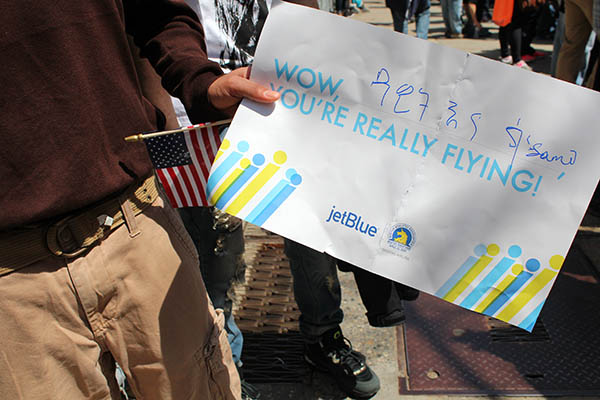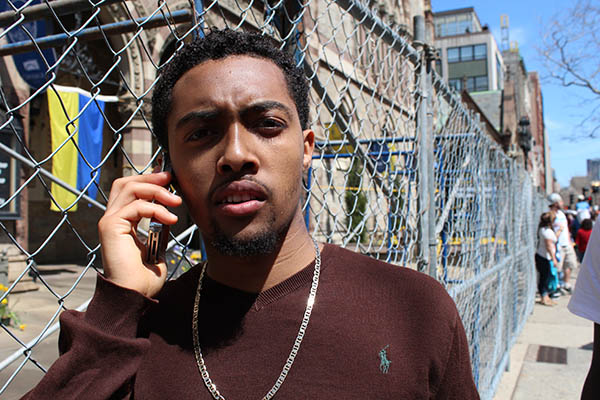Boston Marathon Anniversary in Roxbury from Pavement Pieces on Vimeo.
by Julia Shu
In the aftermath of the Boston Marathon bombing, information about the Tsarnaev brothers began to surface, remnants and clues rising out of a swamp of grief. Of Chechen heritage, the family immigrated to the U.S. when the younger brother, Dzhokhar, was only 8-years- old. Now Dzhokhar Tsarnaev may face the death penalty for his participation in domestic terrorism.
Not surprisingly, vitriol and anger spilled out against both brothers. A comment posted to a conservative blog site read, “There’s not much to add about how the Boston Bombers accepted our generosity (in offering them safe haven) and how they showed their appreciation (by murdering and maiming our innocent citizens.)”
This year, Meb Keflezighi won the very same marathon, clocking in at two hours and eight minutes. He is also an immigrant, having come to the U.S. at age 12 as an Eritrean refugee. One year after the bombing, what can we say, if anything, about being a foreign-born and American-raised young person? That it can lead to both exceptional athleticism and terrible crimes only points to the complexity of the question.
The day before the Boston Marathon, Jaelle Sanon, 17, sat on her couch in front of the TV, surrounded by textbooks and study aids for AP tests. A high school junior, she planned to use her spring break for studying, not attending the marathon. Originally born in Haiti, she sees the marathon as an example of unbalanced media coverage.
“Throughout the whole coverage of the bombing, in Roxbury, there were shootings,” said Sanon. “But none of that was in the media.”
Sanon lives in Roxbury, a part of Boston far removed from the magnolia-lined boulevards of Brookline, where the marathon course reaches the finish line. On April 17th 2013, two days after the bombing, a man was shot just blocks from Sanon’s home. Three days later, another man was shot, again less than a mile away. Both men died.
“That happened that one day,” she said, referring to the bombing, “But we’re basically going through that every day here in Roxbury.”
In 2010, the poverty level in Roxbury was estimated at about 27 percent, over a third greater than the city average. The Tsarnaev brothers lived in Cambridge, a more affluent area. But despite this difference in neighborhood, Sanon shares other similarities with Dzhokhar Tsarnaev. Both arrived in the U.S. at 8, both had older siblings who struggled more with the adjustment.
“Even though they were American and here, they still see innocent people dying every day in their home country,” said Sanon, speaking of the marathon bombers. She recognizes this disconnect between an immigrant child’s adopted country and the country of their birth.
“It’s kind of the same thing for me, with Haiti,” she said, “Even though I’m here, I still know there’s a lot of poverty going on down there.”
She speculates that this pain may have caused the bombing.
“I’m not saying it’s right, but that might have been a reason,” she said.
Boston, like other large U.S. cities, serves as a new home for many immigrants. The Boston Redevelopment Authority reports that in 2008, the city had the sixth largest proportion of foreign-born residents. Research suggests that the immigrant population in Boston is mainly composed of families. And among foreign-born residents, a full 35 percent are young adults. It is a demographic that Sanon will share with Tsarnaev when she turns 18 next year.
But other young immigrants do not see a connection as easily.
Suad Maow, 29, and born in Somalia, moved to the U.S. when she was seven. She now lives in Somerville, just to the north of Cambridge.
“Sometimes I would ask, what would push someone so far that they think the only way their issue or their voice could be heard is to do such a malicious thing?” Maow said, “But I couldn’t even fathom what type of situation would push a human mind to do something like this.”
Maow also recognized the one-track mind of last year’s marathon reporting.
“Other things were happening in the world that you would never know about if you watched CNN,” said Maow, “everywhere you turned, it was bombing, bombing, bombing.”
But unlike Sanon, she see this problem as a symptom of modern day news media.
“It’s becoming a trend, anytime anything happens the media converges, nothing else is on the news but this one thing.”
On the day of the marathon, both Sanon and Maow had other things to do. But Dawit Aynalem waded through crowds to reach security gates bordering the finish line.
“I’m here to support my country, basically,” said Aynalem. Born in Ethiopia, he moved to Boston when he was 12, almost eight years ago.
Untroubled by any worries about media coverage, the treatment of immigrants, or how people might see him, he held up his own marathon sign. It was a JetBlue poster that read “Wow, You’re Really Flying,” above which he had inscribed his own message of support in the Ge’ez script of Ethiopia. He also held an American flag.


